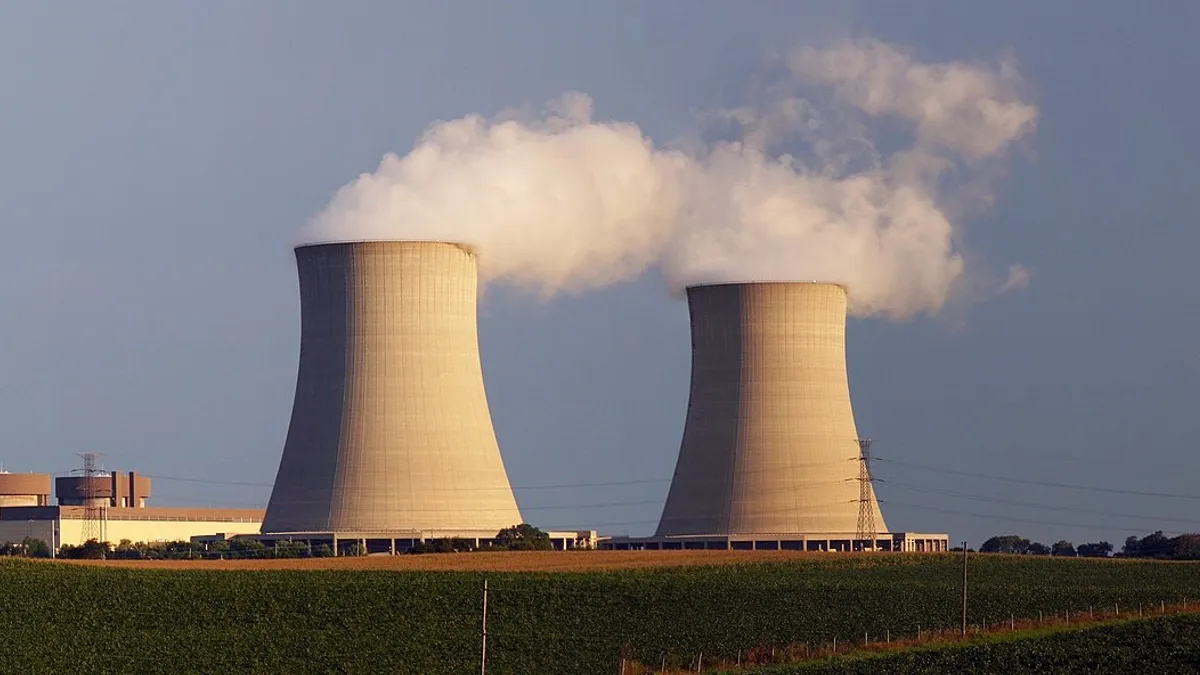Dive Brief:
- Constellation Energy Generation urged the Federal Energy Regulatory Commission to order the PJM Interconnection to adopt rules for providing service to fully isolated co-located load, such as data centers, according to a complaint filed at the agency on Friday.
- “Some local utilities are taking advantage of the lack of tariff rules to thwart competition to serve large end use loads, thereby delaying by several years and significantly increasing costs to serve data centers that are critical to national security, economic development, and other national priorities,” Constellation said.
- The complaint could extend disputes around co-located load in PJM, pushing data centers away from the region, Jeffries analysts said in a research note published Monday. “If there is a time-consuming complaint that would also be negative for the power companies as the increasingly complicated competitive market backdrop will likely lead to hyperscalers preferring regulated markets on the margin,” the analysts said.
Dive Insight:
FERC should order PJM to insert into its tariff guidance on co-located load, which the grid operator issued in April, according to Constellation, an independent power producer that owns nuclear power plants in PJM’s Mid-Atlantic and Midwest footprint.
Constellation’s fast-track complaint is the latest development in a series of disputes at FERC over co-located load. Earlier this month, FERC rejected an amended interconnection service agreement that would have facilitated expanded power sales to a co-located Amazon data center from the Susquehanna nuclear power plant in Pennsylvania that is majority owned by Talen Energy. Exelon and American Electric Power opposed the proposed agreement.
With that decision, the rules for serving fully isolated co-located load in PJM are in “limbo,” Constellation said in its complaint. Exelon’s utilities contend that FERC has declared fully isolated co-located load to be “impossible” and have shut down attempts to co-locate data center load in their systems, Constellation said.
“Until the Commission orders PJM to provide clarity, these delays to serving large load, including critical data center loads, at these plants will continue,” Constellation said.
Exelon utilities are delaying co-location proposals by refusing to cooperate in the “necessary study” process required for possible interconnection changes, including at four Constellation nuclear stations, the independent power producer said.
Commonwealth Edison’s refusal to complete previously agreed-on work during an upcoming planned outage at the LaSalle nuclear plant in Illinois will increase costs to Constellation by $15.3 million to $19 million, according to the complaint.
The LaSalle project is for a proposed hydrogen production facility related to the Midwest Alliance for Clean Hydrogen Hub, according to Constellation.
After addressing the “nuts-and-bolts” technical rules contained in PJM’s co-location guidance, FERC could also consider the issue of whether co-located loads receive grid services even when they are fully isolated from the grid, according to Constellation. The commission could use a paper hearing and settlement process to resolve the issue, the independent power producer said.
“Exelon is committed to ensuring that energy markets operate efficiently, transparently, and equitably to benefit all stakeholders,” company officials said in a statement Tuesday. “Exelon fully supports efforts to foster innovation and enhance national security, and supports customers' rights to co-locate with generators safely, reliably, and in compliance with established rates.”
Exelon plans to participate in Constellation’s complaint proceeding “to advocate for policies that promote fairness, grid reliability, and affordability for all customers,” officials said.
The Jeffries analysts said “Constellation makes strong allegations against Exelon and is the latest escalation in the very public dispute between the two formerly combined companies.”
The analysts said their “base case” is that data centers co-located at nuclear plants will need to pay full transmission and related grid charges.
Meanwhile, FERC staff on Friday said the agency needed more information from Exelon about rate proposals that aim to clarify that load interconnected with their systems must either be designated as “network load” or that appropriate point-to-point transmission service must be arranged for the end-use customer.
In late August Exelon’s utilities — Atlantic City Electric, Baltimore Gas and Election, Commonwealth Edison, Delmarva Power & Light, PECO Energy and Potomac Electric Power — filed identical proposed tariff revisions at FERC related to co-located load.
In another dispute, BGE and PECO asked FERC on Sept. 30 to declare that interconnection of end-use load is a matter of state, not federal, jurisdiction — among other things. The petition includes correspondence between the utilities and Constellation over possible co-located load at the Calvert Cliffs and Limerick nuclear power plants in Maryland and Pennsylvania.















